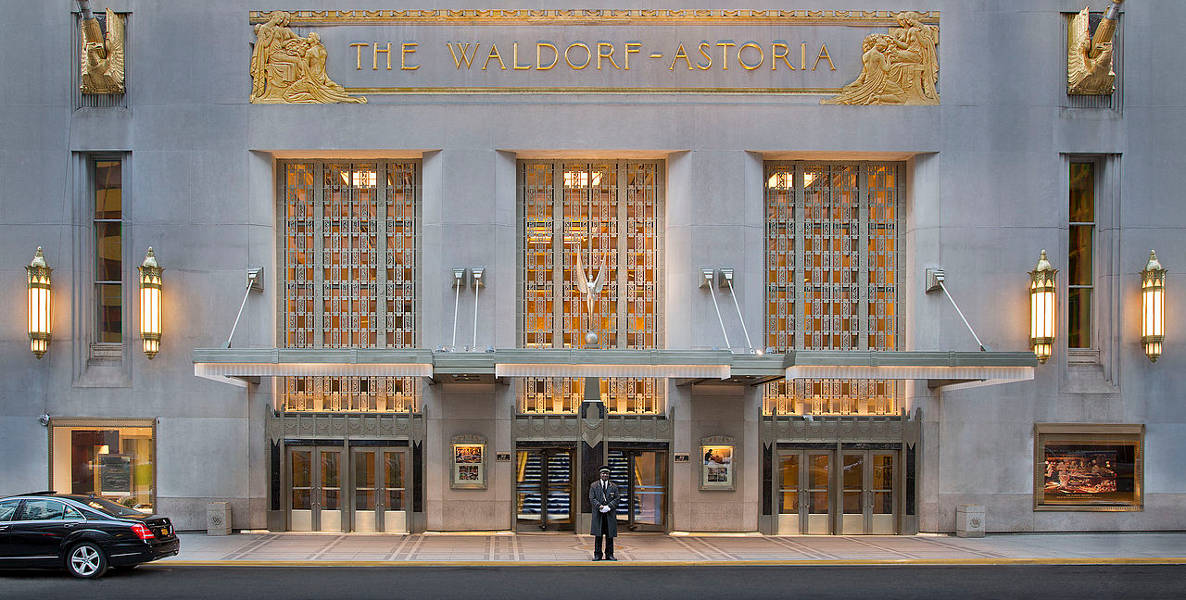Tomorrow, our state’s movers and shakers in the world of politics and business—including many of those who, five months in, are still unable to come up with a state budget—will once again gather at the Waldorf-Astoria in Manhattan for a dizzying three-day lineup of cocktail parties and fundraisers, including a black-tie dinner Saturday night that honors Ed Rendell. The gaudy weekend started over 100 years ago so New York’s titans of industry could keep tabs on our state’s elite. Now it’s a tradition—never mind that the estimated $20 to $50 million in economic impact enriches Gotham and not the Keystone State. (To his credit, Rendell has long advocated relocating the gala to Philadelphia and Pittsburgh in alternating years).
The weekend has become a place for making contacts, for setting deals in motion, and for insiders to chat up insiders. Like many, I attend for part of the weekend, despite my ambivalence about the whole scene. That ambivalence tends to stem from who’s missing; at each party, the lineup of guests reads like a who’s who of our town’s status quo. I’ve written about the dynamic here and here. This year, we at The Citizen decided to try and do something to make the weekend better—more open to new faces and new ideas. We’ve been profiling emerging disruptors from the startup, political and arts worlds, which prompted us to ask: Why don’t we see these people at the Waldorf?
Well, we can do something about that. So we’ve rented a party bus and are loading it up with a lineup of young, and young-at-heart, local change agents as part of an “Innovation Invasion” of Pennsylvania Society. We’ll leave Friday afternoon from Center City and host a Happy Hour at the Waldorf bar—where we’ve invited many of those from the city’s entrenched power structure to come meet and greet a new generation of thought leaders. And then we’ll all attend the Governor Mifflin Society soiree, which is thrown each year by Ceisler Media, American Continental Group, Norfolk Southern, the Stradley, Ronon law firm, and the Global Strategy Group political consulting firm.
We’re doing this for three reasons. First, we don’t want to just write about people doing cool, groundbreaking stuff once—and then move on to the next story du jour. We want to champion in an ongoing way anyone who is committed to making Philadelphia better. So if we can help ambitious change agents network and make contacts—in a town that has historically eaten its young—all the better. Second, we want to respectfully tweak the Old Guard: Philadelphia is changing, and it’s in all of our self-interest for room to be made at our problem-solving table. Third, frankly, some of the Pennsylvania Society parties could use a jolt of energy. Not for nothing, but the last time I attended the Saturday night black-tie gala, it felt like the average age of the room hovered somewhere around deceased. We’re planning on bringing the fun.
Speaking of Saturday night, two such area change agents, Kellan and Nicole Allen White, will be hosting the third annual Pattison-Leader Ball as an alternative to the stuffy gala at the Waldorf. It’s a great option—not least thanks to the soulful stylings of Chris Urban.. This year, for the first time, USA250 will be the title sponsor. For tickets, go to www.pattisonleader.com.
Meantime, here are updates on, or introductions to, some of our disrupting invaders:
Alejandro Gac-Artigas, 26, CEO/Founder Springboard Collaborative

As Gac-Artigas discovered as a first grade teacher, summer can be a dead zone of learning for many students, who experience what educators call the “summer slide”—they arrive in September out of practice with reading, setting them about six months behind in learning for the new school year. Gac-Artigas founded Springboard in 2011 to combat the slide. The success of the last few years allowed Springboard this summer to double in size, to 2,000 students, and expand to the Bay Area. This year they also saw their best results: Students replaced what would have been a 3 month slide with a 3.3 month reading gain. “Philadelphia’s adult illiteracy rate of 22 percent matches the city’s poverty rate,” says Gac-Artigas. “This is the cycle ensnaring our city. The triangle between teachers, parents and students is broken.”
Liz Arnold, 31, anti-fracking activist

Arnold paints herself blue. She jumps on stage with gubernatorial candidates. She dresses like the Pope and shouts out his call for environmentalism. She is, obviously, an activist with a flair for theatrics. But her message to anyone who will listen in Pennsylvania is serious: End fracking, she says, because it is harmful to people, the environment and (in the long run) the state’s economy. You can disagree with her cause, but it is impossible to deny that she is passionate. “I’ve always had a strong aversion to injustice,” she says. “If no one else will speak up, I feel compelled to. I refuse to accept that just because I am not rich I shouldn’t have a say in what our future looks like.”
Danny Cabrera, 23, CEO/Founder Biobots
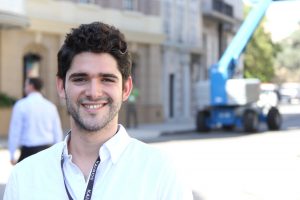
When The Citizen wrote about Cabrera last April, the 23-year-old’s medical technology company, BioBots, had just won the innovation prize at South by Southwest’s tech festival, had raised nearly $2 million in seed money, and was starting to see double digit sales of its device to produce 3D tissues and organs out of human cells. The company, started in a Penn dorm room by Cabrera and his partner Ricardo Solorzano, was set to do for bioprinting what the PC did for computing: Change everything. Now, Biobots has launched a desktop version of its 3D printer with more complex and precise capabilities, and is one step closer to Cabrera’s ultimate goal: Ending the wait-list for organ transplants.
Sylvester Mobley, 36, founder Coded By Kids
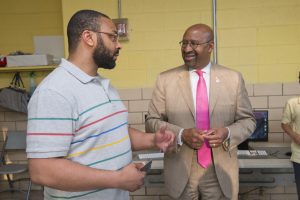
As a former Marine (and Air Force Reservist and Army National Guardsman who served a tour in Iraq), Mobley has grit etched into his bones. But it’s his dedication to bettering the world close at hand that has led the vet to some of his greatest victories. In 2014, Mobley started Coded By Kids with one student at the Marian Anderson Recreation Center in Graduate Hospital. He stuck with it, and now he’s teaching tech skills to students as young as five or six at two area rec centers, and several schools—including Martin Luther King High; he started Coded by U for low-income adults, and soon will add paid adult classes. The goal? Taking people out of poverty with real, solid skills that can lead to well-paid jobs.
What’s the first thing you’d do if you were elected Mayor of Philadelphia? I would create a plan to start tearing down the silos that exist between city government, the corporate sector, the education sector and the nonprofit world. Entities that operate without looking outside of their space to see the impacts they have on the wider community can result in an organization that thinks it is having a positive impact, but is actually having a negative impact. This also results in a lack of coordination between organizations.
Yasmine Mustafa, 31, ROAR for good
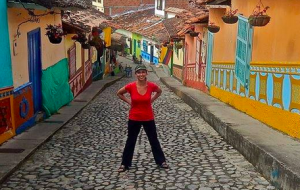
In 1990, Yasmine Mustafa was an 8-year-old Kuwaiti refugee who spoke no English. By 2011, she was a classic American success story, having created and sold her first technology company, a WordPress plug-in called 123LinkIt. Now, she’s launched her second: ROAR for Good, which makes wearable technology in the form of jewelry that emits lasers, alarms and calls for help if women are being attacked. (Once profitable, Mustafa plans to donate some ROAR proceeds to organizations that teach respect, consent and healthy relationships to young people.) She launched a crowdfunding campaign this fall hoping to raise $40,000—and instead got nearly $300,000 from supporters. ROAR’s first line of jewelry is available for pre-order now, and will be manufactured in the spring.
Danielle Mancinelli, 27, Early Literacy Specialist with Children’s Literacy Initiative
A year ago, when Mancinelli was a reading specialist at Mastery Pastorius School, she found her work stymied by one incredibly frustrating thing: The school had no library, so her students had no books to take home to practice reading. So Mancinelli launched a fundraising campaign that has resulted in a 6,000-book library at Pastorius. Now at the Literacy Initiative, Mancinelli coaches K-3 teachers on how best to teach reading, including helping them create a classroom library. She has also launched BRIDGE, a program that brings yoga and creative writing to students.
What’s one thing you would change about Philadelphia? The perception of public schools. There are schools and teachers doing amazing work. I have personally seen teachers making positive changes in the lives of students. I have also seen positive changes on a systemic level. I would shift the dialogue to what is working so we can replicate that.
Erica Atwood, 41, CEO First Degree Consulting
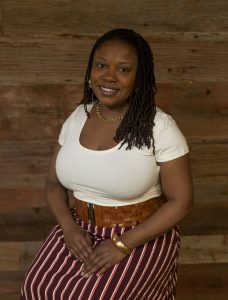
Before leaving City Hall to found First Degree, a firm that will work to connect the public, private and philanthropic sectors with grassroots communities, Atwood was most recently Mayor Nutter’s Director of Black Male Engagement in Philadelphia. With Nutter, she was instrumental in the 2011 creation of Cities United, a national movement aimed at ending urban violence related to African American men and boys. She was the Mistress of Ceremony for this year’s TedX Philadelphia conference, and works as an advisor or board member for several area nonprofits, including United Way and the Philadelphia Youth Poetry Movement.
What’s the first thing you would do if elected Mayor? I would develop ways to support youth in the middle—students and young people who aren’t the A students or the most at-risk. The average everyday kid that doesn’t get the shine needs support as well. There are a lot of good, smart, future leaders that just aren’t getting all they need to achieve educational and career success to reach their full potential.
Casandra Domínguez, 30, Manager of Business Retention and Retail Attraction at the Center City District

At CCD, Domínguez works to increase commercial investment and development downtown, and manages membership for the Central Philadelphia Development Corporation, a non-profit business leadership organization affiliated with the CCD. Originally from Spain, Domínguez has a masters degrees from Penn’s Fels Institute of Government.
What’s the first thing you would do if elected Mayor? I would change the tax structure. For decades, businesses have fled the city and relocated to the suburbs. By reducing business and wage taxes, the city could broaden the tax base and create an environment that encourages businesses to grow and stay in the city, as well as attract companies to relocate to Philadelphia. In the last 15 years Philadelphia has done a good job of attracting residents, now we need to do a good job making this growth sustainable. The tax code is a boring but important place to start.
Keola Harrington, financial counselor at Clarifi
Harrington works to eliminate poverty one family at a time. At Clarifi, she provides one on one financial counseling free of charge for budgeting, building assets, repairing credit, paying off debt. Since 2013, Clarifi has served 8,500 clients, completed over 18,000 counseling session, increased client savings by $852,000 and reduced their debt by $7.1 million. Before Clarifi, Harrington taught algebra at West Philadelphia High School as a Corps Member of City Year Philadelphia, where she now serves on the alumni board.
Nick Marzano, 33, President, Young Involved Philadelphia
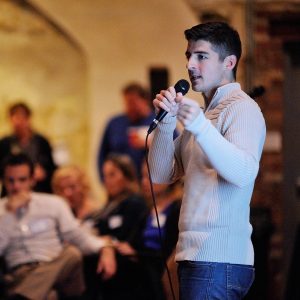
In Marzano’s years as president, he has brought renewed energy to YIP, which connects young Philadelphians to nonprofits and trains them to be leaders. As the group has more than doubled in size, Marzano has led a shift in YIP towards more public engagement, inserting Millenials into the political conversation in a way that can’t be ignored. Last year, YIP’s “Ward 101” inspired more than 25 young Philadelphians to run for committee person seats; the City Council Candidate Convention drew 400 millennials to a job fair-style conversation with candidates; and another 80 came together with The Citizen for the Mayoral MilleniaLab, which paired young people with candidates to brainstorm solutions to Philadelphia’s problems.
What’s the message you want the Old Guard at PA Society to take away from meeting you? Young people are asking ‘why’ in every other sector, and reinventing the ‘how’ of social impact. That same wave of energy is headed for the public sector. Embrace it.
Anton Moore, 29, Director, founder/President, Unity in the Community
A community activist for years, Moore holds educational and awareness-raising events to prevent violence in his South Philly neighborhood and beyond. He is also a committee person for the 48-8 Ward in South Philadelphia. During his career, he’s been honored by the NAACP, Newsone, the 76ers, KYW and the Knight Foundation for his work.
Archna Sahay, 36, City of Philadelphia’s Manager of Entrepreneurial Investment

Sahay, a former wealth manager for private clients, now serves as the city’s liaison between City Hall and the startup/tech community, charged with job creation and economic development in technology fields. She also oversees StartupPHL, the city’s initiative underwritten by First Round Capital’s Josh Kopelman to support startups and entrepreneurs. Previously, she was a program manager for DreamIt Ventures, and also started the Female Founders Network to connect female entrepreneurs. Sahay was recently selected for Leadership Philadelphia’s Connectors and Keepers program which aims to mobilize and connect talented leaders to serve the community, and was named one of PhillyMag’s Best Philadelphians in 2014.
Danielle Wolfe, 30, consultant to child-focused charitable funds
Wolfe immerses herself in fixing education in her day job—as a consultant to (among others) the Center for Hight Impact Philanthropy and the Neubauer Family Foundation—and in her civic work. She is a volunteer Board member for both PhillyCORE Leaders and PhilaSoup, and participates in a giving circle focused on education.
Yuval Yarden, 24, program director for Philly Startup Leaders
To Yarden, a successful city is one that makes room for everyone to innovate—the entrepreneurs she connects through Philly Startup Leaders, which runs bootcamps and networking events for new businesses; recent college grads, whom she helps find mentors (and maybe jobs) through Startup Leaders; and the poorest and youngest Philadelphians, many of whom have been bypassed by the city’s progress of the last few years.
What’s one thing you would change about Philadelphia? If we want Philadelphia to be a truly world class city, we need to decrease persistent poverty. We can bridge the digital divide by offering effective technology education at all schools in Philadelphia with a curriculum designed to generate solutions to the actual problems facing our city. If we want to be a world class city, we need to start by developing home grown world class talent.
Header Photo via Wikimedia Commons


